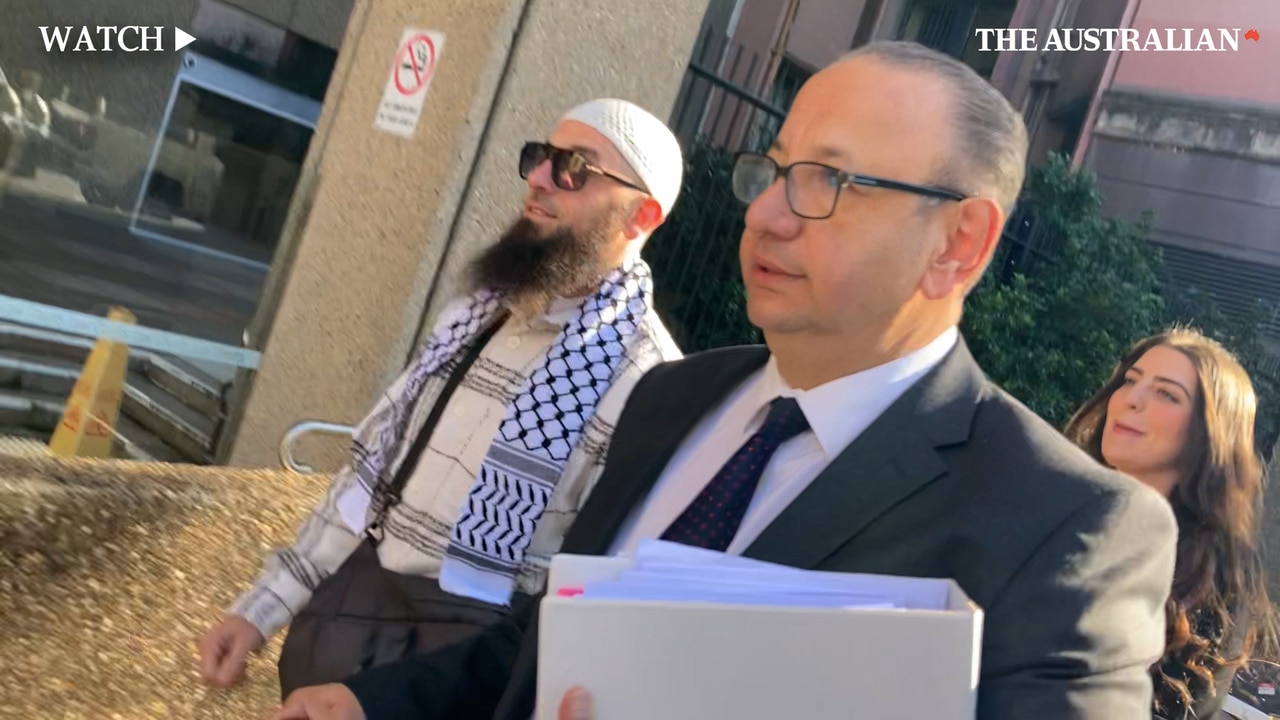Jihadi preacher Wissam Haddad ‘believes in peace’ despite inflammatory sermons
Wissam Haddad has faced allegations of youth radicalisation but by his own account he has guided Sydney’s youth away from the wrong path through ‘prayer, giving and sacrifice’.

Jihadi preacher Wissam Haddad says Islam and the guidance of sheiks led him away from a life of parties and clubbing, a far cry from the alleged youth terror indoctrination and provocative sermons that have led him from the dais to the dock.
A Federal Court racial discrimination trial brought against Mr Haddad by the nation’s peak Jewish body concluded last Friday, prosecuting sermons he made in the wake of the October 7, 2023 Hamas terrorist attacks which he claimed were valid political comments backed by Islamic scripture.
An affidavit submitted by Mr Haddad, 44, to the Federal Court presents him as a self-styled champion of human rights, detailing his stop-and-start Islamic education and claiming his now notorious sermons were made at the request of congregants.
In these speeches, which he said were motivated by his desire for social justice, he called Jewish people “vile”, “treacherous” and “descendants of pigs and monkeys” who would be slaughtered at the end of time.
His self-portrait appears at odds with his decade-long brawl with intelligence services and state and federal authorities who have pushed back on his alleged efforts to promote radical beliefs among a vulnerable population of Western Sydney youths.

It is a demographic Mr Haddad says he wishes only the best for. “During my adolescent years, at around the ages of 18 to 21, I was associating with what I now believe to be the wrong crowd. I spent many nights away from home, partying and clubbing,” his affidavit reads.
“But when I saw my friends go to jail or become seriously physically hurt as a result of their actions, I had a wake-up call and knew it was time to change.”
He describes how Sheik Shadi Alsuleiman – one of Australia’s most well recognised Islamic leaders and the president of the Australian National Imams Council – took Mr Haddad into his tutelage
“Sheik Shadi taught me, through Islamic scripture and lessons, that the life I was living was spiritually wrong and that the people I was affiliating myself with were not living in accordance with the origins of Islam,” he said.
“On occasions, I would give talks about how I was in a very dark place and was able to turn my life around through prayer, giving and sacrifice. I felt happy and fulfilled that I was able to inspire fellow young Muslim youth with my story.”

During the early 2010s, while operating the al-Risalah Islamic Centre, Mr Haddad says he was driven to action by the pro-Democracy Arab Spring protests, despite his own opposition to democratic processes.
“As a Muslim in Australia witnessing this and seeing the oppression of fellow Muslims, I did what I could to support fellow Muslims and individuals by raising awareness and delivering sermons,” he said.
In these sermons he professed his support for ISIS and said he would “live or die” for the Islamic State Shahada flag. On January 9, 2015, he was raided by the Australian Federal Police. They found tasers, a machete and troves of taped extremist sermons including a sermon by former al-Qa’ida leader Abu Musab al-Zarqawi.
Mr Haddad was put on a good behaviour bond and was convicted on weapons charges.

The al-Risalah Islamic Centre was considered by counter-terrorism authorities to be a hub for radical preaching and a meeting point for Sydney’s small community of Islamic extremists.
Mr Haddad shared friendly connections with terrorists Khaled Sharrouf and Mohamed Elomar who both fled Australia to fight for ISIS in Iraq and Syria. The pair were killed while fighting in Mosul in 2015. Elomar attracted global headlines when a photo circulated on social media of him posing with a pair of served heads.
A recent report by ABC’s Four Corners featured the testimony of an alleged ASIO undercover agent who described Mr Haddad’s Al Madina Dawah Centre as a breeding ground for youth radicalisation.
When The Australian revealed Mr Haddad’s allegedly anti-Semitic sermons in November 2023, NSW Police and the Australian Federal Police quickly investigated. Their decision not to lay charges paved the way for civil action by the Executive Council of Australian Jewry.
“On or around 8 October 2023, an Islamic individual male within our community … said to me: ‘(Mr Haddad), how is it you can give these sermons and teachings of peace and love … Our people are getting killed, someone has to speak up’,” Mr Haddad’s affidavit reads.
“I decided to prepare sermons and lectures which might provide support and spiritual comfort to those who have been directly and indirectly adversely affected.
“The message I was intending to deliver to my congregation was that as a religion and a community that believes in peace, giving a voice to the voiceless and fighting for the weak, we must stand up together.”
It was not a message clear to many. Mr Haddad’s own barrister Andrew Boe conceded he may have been a “bad preacher” whose sermons were clumsily constructed.
ECAJ co-chief executive Peter Wertheim was more harsh.
“We have finally brought to account someone who despises Australia’s way of life, our system of government and our precious freedoms, while invoking those same freedoms as an excuse for vilifying entire communities who follow a different religion or no religion at all,” he said outside court on Friday.




